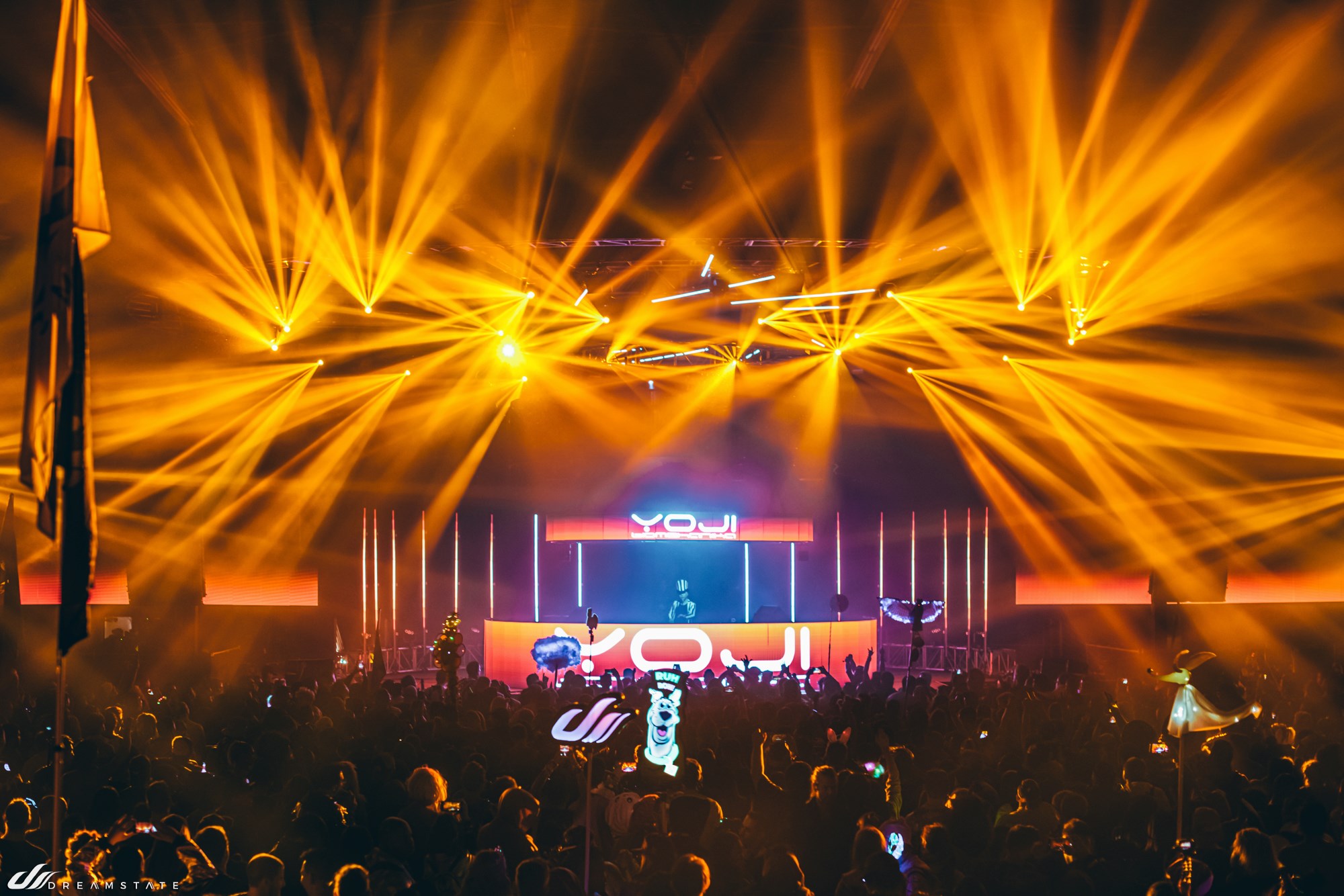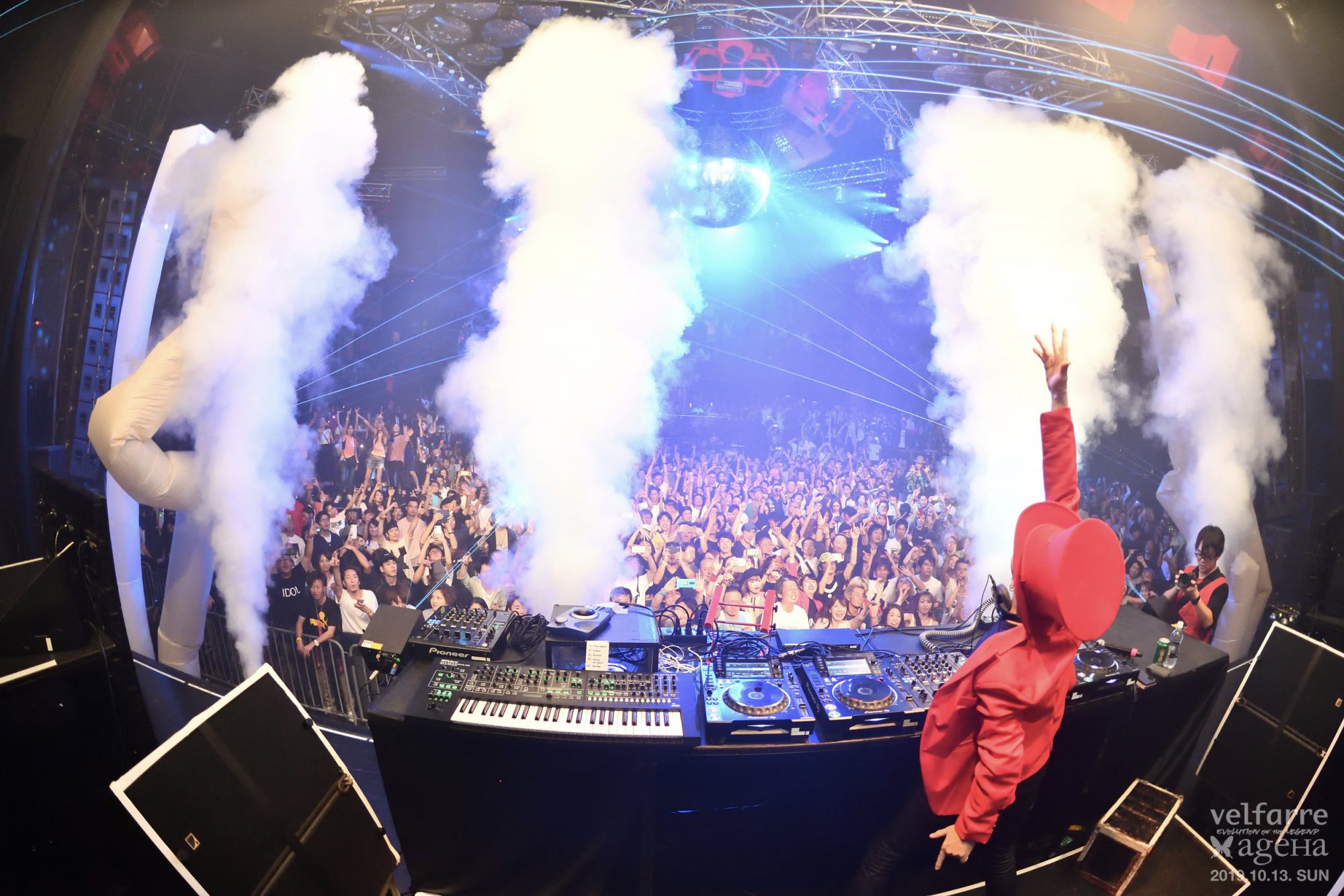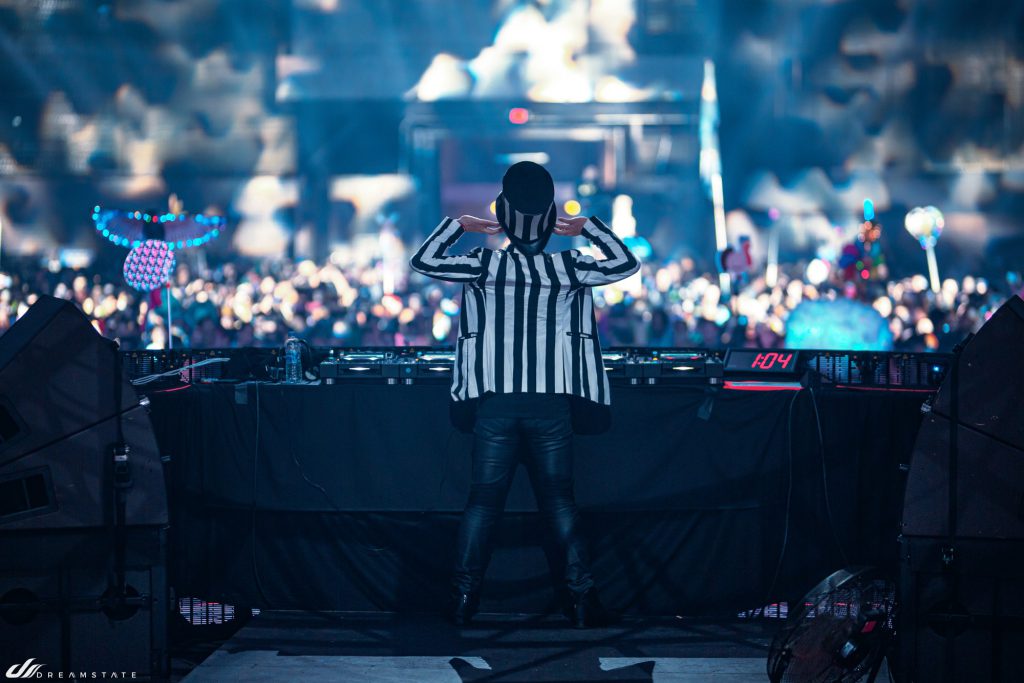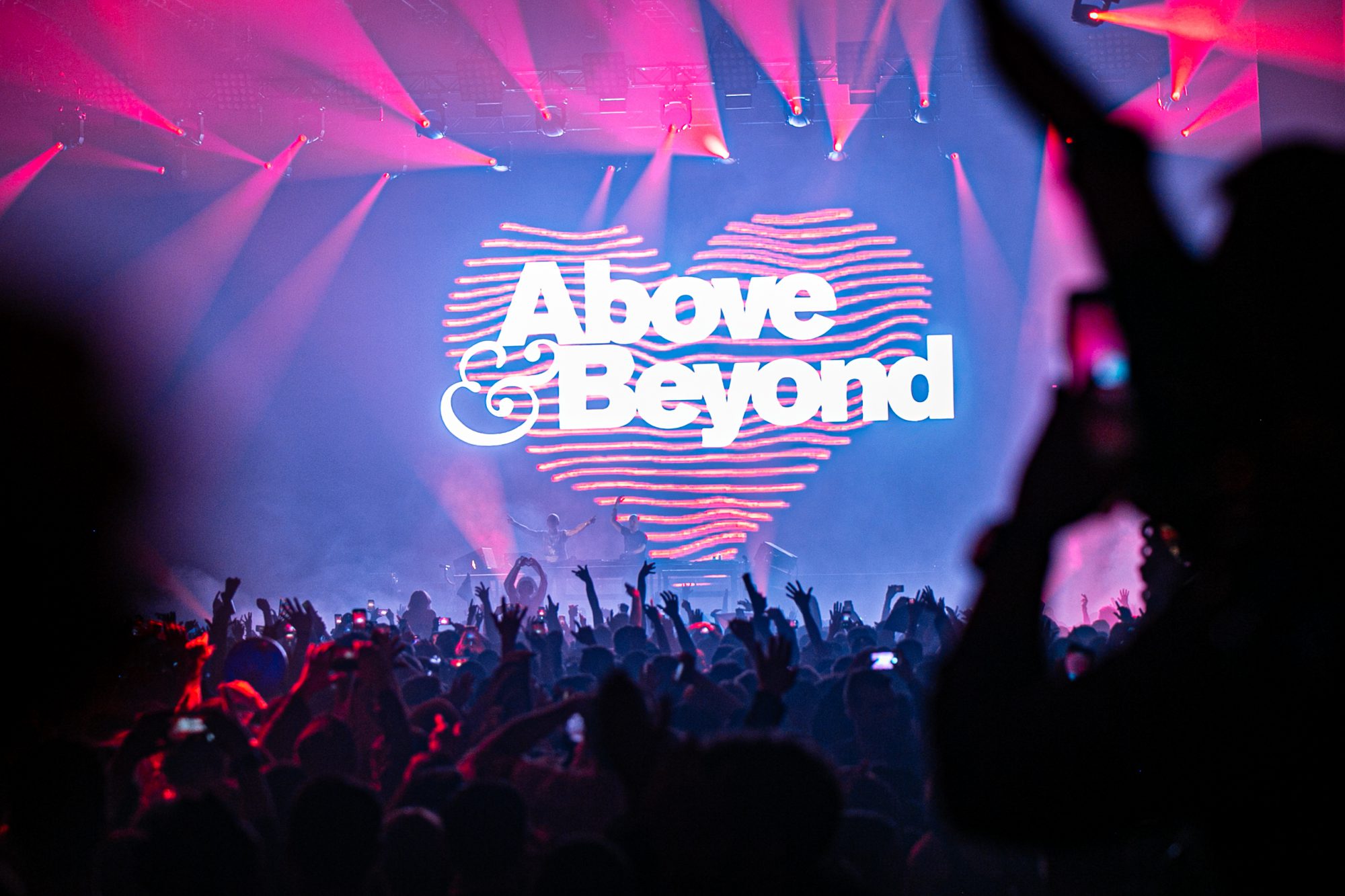After smashing the house at Dreamstate SoCal, legendary artist Yoji Biomehanika sat down with us to reflect on his lengthy career and plenty more!
There are few characters in the electronic scene that can hold a candle to the unique style of Yoji Biomehanika. From day one of his over thirty-year career Yoji has set his own rules and path through his expressive blend of hard techno, trance, and hard dance. After exploding out of the gate with successes in the trance scene, Yoji anchored many of the world’s biggest dance music festival brands in the 2000s – Sensation, DefQon1, Trance Energy, and more.
As the market drifted worldwide to new styles and sounds, Yoji did not slow down and continued to break the wheel of expectation. He zigged and zagged every trend with his unique flair and placed a finger on the pulse of his hard energetic sound even when the explosion of big room took the world by storm. Additionally, he weathered the death of the vinyl era and for a while, remained at home in Japan helping his community recover from the Tōhoku earthquake and ensuing tsunami in 2011.
In a stroke of brilliant luck, the US was reintroduced to his brand at the fifth anniversary of Dreamstate. We were honored to provide a unique look into this rocking hard dance talent and here it is in full. So read on to explore how Yoji created his style, what Dreamstate SoCal meant for him, and how his creativity is still running strong today!
Check out Yoji Biomehanika – Live at Dreamstate SoCal 2019 on YouTube:
Hey everyone, you’re sitting down with MyStro. Welcome to another edition of “Storylines”, where we dive deeper into the history of dance music with some of the people who have made it what it is today. Today I have a very special guest the one and only Yoji Biomehanika, straight from Japan. How are you doing today Yoji?
Not too bad. I’m just still keeping up with writing my music. That’s just as I said to you, I strike out on my own, so I’m just doing my passion. That’s it.
That’s what you should do. Opening is something that’s easy, but closing down is a hard thing to do. How was closing down day one of Dreamstate SoCal last night and how does it compare to other festivals that you’ve had the pleasure of anchoring?
This is a pretty difficult question. I don’t think you can compare it with other festivals because individually each festival has its own concept. Dreamstate is unique as well in vibe as the crowd itself. On site I thought, “What should I do for the different people?”
Different crowds? Yeah.
Different crowds! For the American crowd it is quite pure I felt. For example, last night, I walked around and viewed the festival sites: the crowd is quite older. It’s totally different from a recent cheesy festival, you know? So I told myself, “They really love that kind [the older style] of music,” so I got more into the music. It was quite impressive for me.
I played quite a wide range of my musical stuff because it has already been 30 years for my music writing, but I still get to progress in my life and music today. I don’t want to just play “the classics” you know? Some of the tracks I played were the older ones, but all the stuff has been updated for my recent skills. I just want to express that I still am progressing.
Everybody needs growth.
No, not growth [Laughs] – only becoming perfect!

Keeping the focus on festivals in general, you had the joy of playing Trance Energy, Sensation Black, DefQon, EDC, and Tomorrowland. What strikes you the most about dance music culture and its strength?
I never thought about that, because I told you that I just strike out on my own style. Maybe a better word is desire; musical desire! All those things are just the results, you know?
So, I just do it on my own, and I never think about the general thing. They also are diverse; I’m just one of the artists and one of the musicians. Of course, I’m a professional, so I accept direction from the promoter with some requests for the show, but basically, I just go on my own.
Is the US to you different than the crowds you see in Japan?
Yeah, I got asked the same kind of question with an interview in the past, but Japan is a very special country. It is such a long distance from Europe and America, and it is an advanced musical country. So, I can’t compare. The big difference is no big “drops” in Japanese music, so it is very hard to compare.
When I play in Japan anywhere, people just get into my music… just with alcohol… but purely, they get into the music with dancing. It is someplace that you need to go to… but they have a very different method of getting satisfied with music and dancing. I’d say “different methods” is what they have, so it is a very big difference I think.

Every culture is going to have a unique way they respond to music. As you mentioned, you celebrated your 25th and then 30th year of the industry recently. Looking back, for you, what was probably the biggest moment in your particular career?
The biggest moment for me is the day I launched my label Hellhouse Recordings. That day it was my first big international activities, you know, where it all started. Before I started my own label, I had no choices. I wanted to release my tracks, but I need to send a demo to some of the labels, then the labels have their own…
Mentality?
Mentality… or the culture. So they have judged the sound, “How was Yoji’s demo?” So it was so stressful, and I just wanted to express my original sound without any culture but there’s no choice. So how difficult is it to set up the label? How difficult is it to deal with the distribution to express a new sound for my own?
Then, one day, I got some great news from a great man at a big distributor in the UK, that he gave me a chance, “Yoji, it’s a time to start your label! You don’t need the demo or to be sending a demo to any other label. You can do anything. Just go on and do it.” His name was Satoshi for Wind and Sound, the parent company was Pinnacle [Recordings]. At that time they were well known with Paul Oakenfold releases and whatnot.
Yeah, back in the day. Yeah, I remember them.
Yeah! I started Hellhouse Recordings with distribution via Satoshi in the UK. When I started the Hellhouse name, then I was finally free to release my own tracks. That’s when we started the new phenomenon with a Yoji style. It was the biggest memory of the days of my life.
Speaking of the older labels, if you look at someone who’s coming up in the scene right now… what advice would you give them from your lessons of the industry?
Just believe in your music, that’s it. So one day, you can meet up somewhere and are allowed to join and work with the next level of talent. So, even though, if you work with as a man or as a woman, whatever, if the person just wants to express their own music. Just believe in your own music. That’s it.
Was that the advice you gave Remo-con?
Yeah, yeah I found him. He was quite, ah… He worked well in commercial music, business culture, or, what is it, community. Then, I picked up Remo-con, and saw he has a lot of content and possibility. I spoke with him, “Just go on, there is more personality music, music personality, and don’t care about the commercial stuff.” So I started growing and working with Remo-con. Yeah, he is one of the biggest talents in Japan still.
I still see him pop up once in a while on the music charts over the years. Let’s flip a little bit more to the present. You’ve got Banging Globe and DieTunes projects now! What do you look to do with those labels, today, that’s maybe different from before?
Yeah yeah! So basically nothing so different from Hellhouse, only another name as Hellhouse was forced to stop because of the end of the vinyl days, you know?
I remember how that all fell apart.
It was then I contracted with one of the biggest labels in Japan, a major label, Avex, who was releasing its own stuff as a domestic shop. Hellhouse was basically distributing from the UK and while it dealt with the fallout, I had the two ways to release my stuff. Then Hellhouse goes away but I still was one of artists on Avex Music. I released on Avex domestically, but I needed another platform for the releases overseas. So I worked with the label developing the international stuff and I choose the new name: DieTunes. That’s it. The basic concept is the same.
You’ve done a lot of work with Goodgreef over the years out of the UK. What do they, as a brand, represent to you or do well that meets up with “Yoji style” essentially?
Yeah. Goodgreef is one of the biggest partners in the UK for spreading my sound. So back in the days of Dance Valley in Holland… I’m not just a hard dance purist, not a hard house purist, not a hard trance purist. I’m totally a hybrid person. Basically I love the harder stuff, but I won’t… I don’t want to just purely be pushing that one category. One day I shouted, “The hard dance, it means that you like any harder music. Hard techno, hard trance, hard house! Yeah, that what it means when I say hard dance.”
Goodgreef was very curious about my concept from about 20 years ago. I don’t remember exactly, but that’s when Barry from Goodgreef, Barry the head person, allowed me to do my concept. They also want to do that kind of hard dance brand. It was a good day and a good meeting with him. This started the collaboration. They started a brief history with me, but still, it is a good relationship. I will play in the 20-year anniversary party next year.
You touched on earlier how you continue to kind of reinvent your sound because of hard dance, hard house, and hard trance. You went through the original years, and then you went to just “Yoji” for a while, and now you’re kind of back to your original name.
Yeah. [Laughs] You really know that!
What drew you back to your original name?
Why I stopped the “Yoji Biomehanika” name is a very simple. I have the two elements towards my music production: melody and hard groove. One day it was so difficult to combine the melody stuff and hard groove because I’ve written a lot of tracks with the kind of same style melody and hard groove.
Then I decided “Okay, I’ll split the melody and grooves.” I decided I’m pushing just melody under the name of ‘Biomehanika'” with no dance music groove, just writing the beautiful music, and another one lifted the hard groove for pushing more energy or focused on more groove. This is when I started the “tech dance” to focus on more grooves just for dancing. Suddenly, people asked, you know, “Where’re Yoji’s melodies…?”
That’s my identity basically: a melody and grooves. Today, I’m back to my original sound. I wanted more Yoji Biomehanika, to get back to Yoji Biomehanika. I really started Yoji Biomehanika… after just the name “Yoji” for only seven years, and then I stopped and got back to Yoji Biomehanika.
Finally, this is just kind of a curiosity for me, how long does your makeup or costume, or however you want to term it, actually take to get together?
[Laughs] You mean just before the show?
Yeah. How long do you prep typically?
Okay, if the promoter gives me big money, I take two hours for makeup. If they are cheapo, only 15 minutes.
So what you’re telling me is you throw the coat and top hat on and you’re good?
[Laughs] Yeah, yeah, yeah.
Finally, I just want to give you the chance to say whatever you’d like to your fans…
I just want to stay open, just keep writing music, and keep on dancing and raving. That’s it!
Well, I want to thank you for your time today Yoji. It’s been a pleasure.
Thank you from me too. It’s been a pleasure for me too.
Connect with Yoji Biomehanika on Social Media:
Website | Facebook | Twitter | Instagram | SoundCloud | Mixcloud









